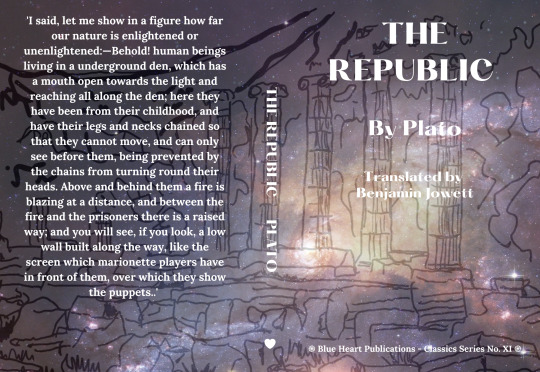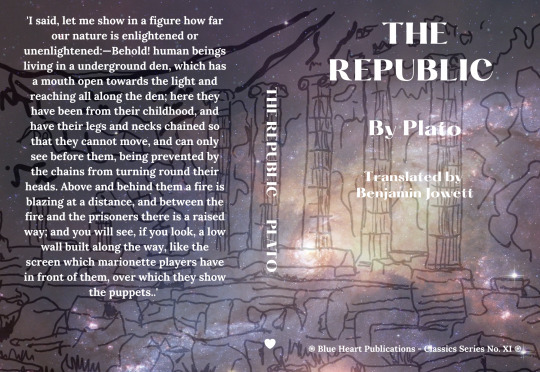#Benjamin Jowett
Text
"The Republic: Plato's Timeless Exploration of Justice, Politics, and the Philosopher's Quest"

"The Republic," translated by Benjamin Jowett, stands as a timeless cornerstone in the philosophical canon, an intellectual odyssey that navigates the intricate landscapes of justice, politics, and the philosopher's pursuit of truth. Penned by Plato in the 4th century BCE, this Socratic dialogue remains a foundational work in political philosophy, ethics, and metaphysics. Jowett's translation, undertaken in the 19th century, preserves the essence of Plato's probing inquiries and dialectical brilliance, allowing readers to engage with the profound ideas that continue to shape the foundations of Western thought.
Plato's magnum opus unfolds as a series of dialogues, primarily led by Socrates, engaging with various interlocutors. The central exploration revolves around the question of justice, which becomes a metaphorical vessel for the examination of the ideal state, the role of individuals within society, and the nature of knowledge itself. The allegory of the cave, the tripartite division of the soul, and the philosopher-king are just a few facets of this multifaceted work that have reverberated through the corridors of academia for centuries.
The dialogue begins with an inquiry into the nature of justice as Socrates engages with characters like Thrasymachus, Glaucon, and Adeimantus. The discourse takes a dramatic turn as Plato introduces the allegory of the cave, an enduring metaphor for the journey from ignorance to enlightenment. This vivid imagery captures the transformative power of education and the philosopher's duty to ascend from the shadows of ignorance into the illuminating realm of true knowledge.
"The Republic" also ventures into the construction of an ideal state, led by philosopher-kings who possess both intellectual acumen and a commitment to the common good. Plato's vision challenges conventional notions of governance and explores the intricacies of a society governed by wisdom rather than mere political expediency. The dialogue delves into the organization of classes, the role of education, and the philosopher's ability to perceive the ultimate Form of the Good.
Benjamin Jowett's translation captures the nuances of Plato's intricate prose while maintaining accessibility for modern readers. His careful rendering of Socratic dialogues preserves the conversational tone and intellectual rigor that characterize the original work. Jowett's translation, though dated, remains widely used and respected, emphasizing the enduring appeal and significance of "The Republic" across generations.
"The Republic" is not merely an exploration of political theory; it is a profound meditation on the human condition. Plato's insights into the nature of knowledge, the complexities of justice, and the philosopher's role in society transcend the historical and cultural contexts in which they were conceived. The work prompts readers to question the foundations of their beliefs, to examine the societal structures they inhabit, and to consider the eternal pursuit of wisdom as a guiding principle.
In conclusion, "The Republic" by Plato, in Benjamin Jowett's translation, is a philosophical masterpiece that continues to shape the intellectual landscape. Its profound inquiries into justice, governance, and the nature of reality invite readers to embark on a philosophical journey that transcends time. The enduring relevance of Plato's ideas, coupled with Jowett's insightful translation, ensures that "The Republic" remains an indispensable text for anyone seeking a deeper understanding of the complexities of human existence and the perennial quest for a just society.
Plato's "The Republic" is available in Amazon in paperback 16.99$ and hardcover 24.99$ editions.
Number of pages: 471
Language: English
Rating: 10/10
Link of the book!
Review By: King's Cat
#Plato#The Republic#Socratic dialogue#Benjamin Jowett#Political philosophy#Ethics#Metaphysics#Ideal state#Justice#Knowledge#Allegory of the cave#Tripartite division of the soul#Philosopher-king#Thrasymachus#Glaucon#Adeimantus#Education#Allegory#Ideal society#Common good#Organization of classes#Form of the Good#Intellectual acumen#Political expediency#Conversational tone#Intellectual rigor#Human condition#Philosophical journey#Wisdom#Historical context
3 notes
·
View notes
Text
"The Republic: Plato's Timeless Exploration of Justice, Politics, and the Philosopher's Quest"

"The Republic," translated by Benjamin Jowett, stands as a timeless cornerstone in the philosophical canon, an intellectual odyssey that navigates the intricate landscapes of justice, politics, and the philosopher's pursuit of truth. Penned by Plato in the 4th century BCE, this Socratic dialogue remains a foundational work in political philosophy, ethics, and metaphysics. Jowett's translation, undertaken in the 19th century, preserves the essence of Plato's probing inquiries and dialectical brilliance, allowing readers to engage with the profound ideas that continue to shape the foundations of Western thought.
Plato's magnum opus unfolds as a series of dialogues, primarily led by Socrates, engaging with various interlocutors. The central exploration revolves around the question of justice, which becomes a metaphorical vessel for the examination of the ideal state, the role of individuals within society, and the nature of knowledge itself. The allegory of the cave, the tripartite division of the soul, and the philosopher-king are just a few facets of this multifaceted work that have reverberated through the corridors of academia for centuries.
The dialogue begins with an inquiry into the nature of justice as Socrates engages with characters like Thrasymachus, Glaucon, and Adeimantus. The discourse takes a dramatic turn as Plato introduces the allegory of the cave, an enduring metaphor for the journey from ignorance to enlightenment. This vivid imagery captures the transformative power of education and the philosopher's duty to ascend from the shadows of ignorance into the illuminating realm of true knowledge.
"The Republic" also ventures into the construction of an ideal state, led by philosopher-kings who possess both intellectual acumen and a commitment to the common good. Plato's vision challenges conventional notions of governance and explores the intricacies of a society governed by wisdom rather than mere political expediency. The dialogue delves into the organization of classes, the role of education, and the philosopher's ability to perceive the ultimate Form of the Good.
Benjamin Jowett's translation captures the nuances of Plato's intricate prose while maintaining accessibility for modern readers. His careful rendering of Socratic dialogues preserves the conversational tone and intellectual rigor that characterize the original work. Jowett's translation, though dated, remains widely used and respected, emphasizing the enduring appeal and significance of "The Republic" across generations.
"The Republic" is not merely an exploration of political theory; it is a profound meditation on the human condition. Plato's insights into the nature of knowledge, the complexities of justice, and the philosopher's role in society transcend the historical and cultural contexts in which they were conceived. The work prompts readers to question the foundations of their beliefs, to examine the societal structures they inhabit, and to consider the eternal pursuit of wisdom as a guiding principle.
In conclusion, "The Republic" by Plato, in Benjamin Jowett's translation, is a philosophical masterpiece that continues to shape the intellectual landscape. Its profound inquiries into justice, governance, and the nature of reality invite readers to embark on a philosophical journey that transcends time. The enduring relevance of Plato's ideas, coupled with Jowett's insightful translation, ensures that "The Republic" remains an indispensable text for anyone seeking a deeper understanding of the complexities of human existence and the perennial quest for a just society.
Plato's "The Republic" is available in Amazon in paperback 16.99$ and hardcover 24.99$ editions.
Number of pages: 471
Language: English
Rating: 10/10
Link of the book!
Review By: King's Cat
#Plato#The Republic#Socratic dialogue#Benjamin Jowett#Political philosophy#Ethics#Metaphysics#Ideal state#Justice#Knowledge#Allegory of the cave#Tripartite division of the soul#Philosopher-king#Thrasymachus#Glaucon#Adeimantus#Education#Allegory#Ideal society#Common good#Organization of classes#Form of the Good#Intellectual acumen#Political expediency#Conversational tone#Intellectual rigor#Human condition#Philosophical journey#Wisdom#Historical context
0 notes
Text
The hour of departure has arrived, and we go our ways – I to die, and you to live. Which is better God only knows.
PLATO, Apology, trans. Benjamin Jowett
1 note
·
View note
Text








Velcinta + windows (Benjamin Jowett; Bill Withers; Franz Kafka, "Letters to Felice")
#idk this probably sucks#but it'll make my brain itch if i don't share it#velcinta#cinta kaz#vel sartha#andor#my posts
69 notes
·
View notes
Text
“Further, they shall not confuse the infernal deities and their rites with the Gods who are termed heavenly and their rites, but shall separate them, giving to Pluto his own in the twelfth month, which is sacred to him, according to the law. To such a deity warlike men should entertain no aversion, but they should honour him as being always the best friend of man.”- Plato, Laws (Book VIII) (trans. Benjamin Jowett) (Greek philosopher C4th B.C.)
Happy month of Hades!
In my practice, I interpret Hades as a god of endings: the end of life, of girlhood, of the harvest. It makes sense that his sacred month takes place at the end of the year. Hope everyone honors Hades this December 🫶🏻
44 notes
·
View notes
Photo

Never complain, never explain.
- Benjamin Disraeli
The royal family's unwritten rule of ‘never complain, never explain’ has served it well to weather many crises and storms that circulated around it. The late Queen Elizabeth II was masterful in remaining stoic and dignified as those around her lost their heads. She personified the unwritten rule that safely navigated the British monarchy through tough times.
But the motto has its origins not with a member of the royal family but with a comment made by a British prime minister, Benjamin Disraeli, who served two terms under Queen Victoria.
Disraeli died in 1881 and the earliest attribution of the quote in full was made to him in a 1903 work by John Morley. Disraeli's comment is thought to have been adapted from notes made by a Master of Balliol College, Oxford, Benjamin Jowett, whose "Maxims for a Statesman" date from 1873-76. Jowett's maxims comprised over eleven pieces of advice, including: "never quarrel, never explain, never hate, never fret, never fail" and "never tell".
Current and future members of the Windsor royal family could do worse than follow her late majesty’s wise example.
#disraeli#benjamin disraeli#quote#monarchy#britain#queen elizabeth II#media#scandal#society#family firm#prince william#prince charles#king charles iii#prince harry
125 notes
·
View notes
Photo



Apology, Plato, translation by Benjamin Jowett
wenzhou + literary quotes (23/∞)
#Socrates is rolling in his grave at me using Apology comedically#Word of Honor#Shan He Ling#Wen Kexing#my woh tag#wz quotes
37 notes
·
View notes
Text
Full credits list for Literature Girl Insane
@venus-is-thinking and @accirax's Google Doc really started me off here, so shoutout to these two. I have NEARLY (update: it's now complete!) got a complete credits list for the video.
Below the cut is the full list of credits from 3:45:
ORIGINAL LITERATURE GIRL INSANE TEAM
Don (sound engineer)
Len Kagamine (incorrectly credited–this is a Rin Kagamine song)
karasuyasabou (original uploader)
Sayaka Siduki (illustrator)
Coleena Wu (English translation)
Yoppei (vocalist)
AUTHORS/COMPOSERS
Lewis Carroll (Alice’s Adventures in Wonderland)
Paul W. Chodas (The Collision of Comet Shoemaker–Levy 9 and Jupiter)
Agatha Christie (Murder on the Orient Express; And Then There Were None)
Osamu Dazai (The Setting Sun; The Flowers of Buffoonery; No Longer Human)
Julius Fucik (Entrance of the Gladiators)
Joseph Heller (Catch-22)
Motojiro Kaiji (Lemon)
Yasunari Kawabata (Snow Country)
Yumeno Kyusaku (Dogra Magra)
Ursula K. Le Guin (The Ones Who Walk Away From Omelas)
Kenji Miyazawa (Ame ni mo makezu)
Thomas More (Utopia––surname is incorrectly spelled as "Moore")
Plato (Six Great Dialogues)
Soseki Natsume (I Am a Cat)
Antoine de Saint-Exupery (The Little Prince)
William Shakespeare (Hamlet; Macbeth)
Sun Tzu (The Art of War)
Donald K. Yeomans (The Collision of Comet Shoemaker–Levy 9 and Jupiter)
TRANSLATORS
Kan-Ichi Ando (I Am a Cat)
Sam Bett (The Flowers of Buffoonery)
Alfred Birnbaum (Lemon)
Lionel Giles (The Art of War)
Benjamin Jowett (Six Great Dialogues)
Donald Keene (The Setting Sun; No Longer Human)
Edward G. Seidensticker (Snow Country)
David Sulz (Ame ni mo makezu)
18 notes
·
View notes
Text
"although I do not suppose that either of us knows anything really beautiful and good, I am better off than he is – for he knows nothing, and thinks he knows. I neither know nor think I know" - Socrates [Plato, Apology, Benjamin Jowett translation]
'We can know only that we know nothing. And that is the highest degree of human wisdom.' - Pierre [Leo Tolstoy, War and Peace]
“Maester Luwin taught you well, Jon Snow. Your mind is as deft as your blade, it would seem.” - Maester Aemon
“You Know Nothing, Jon Snow” - Jon [GRRM, ASoIaF]
#Jon Snow#GRRM#Pierre Bezukhov#Leo Tolstoy#Socrates#Plato#You know nothing#It's bizarre how the show twisted what is meant to highlight Jon's wisdom and use it to imply that he is an idiot#I guess ultimate hacks D&D never read Tolstoy in their expensive college courses while failing upwards
13 notes
·
View notes
Text
"And when one of them meets with his other half, the actual half of himself, whether he be a lover of youth or a lover of another sort, the pair are lost in an amazement of love and friendship and intimacy, and would not be out of the other's sight, as I may say, even for a moment: these are the people who pass their whole lives together; yet they could not explain what they desire of one another. For the intense yearning which each of them has towards the other does not appear to be the desire of lover's intercourse, but of something else which the soul of either evidently desires and cannot tell, and of which she has only a dark and doubtful presentiment. Suppose Hephaestus, with his instruments, to come to the pair who are lying side, by side and to say to them, "What do you people want of one another?" they would be unable to explain. And suppose further, that when he saw their perplexity he said: "Do you desire to be wholly one; always day and night to be in one another's company? for if this is what you desire, I am ready to melt you into one and let you grow together, so that being two you shall become one, and while you live a common life as if you were a single man, and after your death in the world below still be one departed soul instead of two-I ask whether this is what you lovingly desire, and whether you are satisfied to attain this?"-there is not a man of them who when he heard the proposal would deny or would not acknowledge that this meeting and melting into one another, this becoming one instead of two, was the very expression of his ancient need. And the reason is that human nature was originally one and we were a whole, and the desire and pursuit of the whole is called love. There was a time, I say, when we were one, but now because of the wickedness of mankind God has dispersed us, as the Arcadians were dispersed into villages by the Lacedaemonians."
--Plato, Symposium, Translated by Benjamin Jowett
9 notes
·
View notes
Text
ENGLISH BOARDING SCHOOLS [and one French example]
"OXFORD - CAMBRIDGE HARROW – ETON – AND OTHERS Oxford and Cambridge are referred to together as Oxbridge, schools for the rich and aristocratic where the dons, following a Middle-Ages custom, were not married, but where an inexhaustible supply of highborn boys were at their disposal. Lads were trained academically and homosexually on courses of Greek and Latin classics, the first step of which were the prep schools of Repton, Harrow, Winchester and others.
Of disputed educational value in the past, today Oxbridge rank in the top 5 of the world’s universities, and many of the schools that prepare students for entrance into Oxbridge are often, intellectually, today, the crème de la crème. Oxbridge were ruled by dons, professors who lived in the upper-class world they created in their image, exclusive and privileged to an unbelievable extend because they could do as they pleased with university monies, live in lavish surroundings, kowtowed to like emperors by teachers and staff. One was Benjamin Jowett who ruled Balliol College, Oxford, from 1870 to 1893, about whom one wrote:
First am I; my name is Jowett.
There’s no knowledge but I know it.
I am Master of this college:
What I don’t know isn’t knowledge.
John Sparrow held sway over All Souls College, Oxford, in the 1950s and was a homosexual who cruised London. He was against the decriminalization of homosexuality because, as another don, Noel Annan wrote in his book The Dons: Mentors, Eccentrics, and Geniuses, Sparrow felt two things were necessary for homosexual pleasure, a sense of both guilt and danger. Margaret Thatcher ended their paradise in the 1980s by asking the question What-the-hell-are-they-doing with Britain’s money?, and, when she found out, she put a stop to it."
The information above is taken from a book, complete with sources, I'm pretty sure was written by a pedophile. He just happens to be one who loves his history enough to record it. I won't post his name publicly, but if anyone DMs and wants to know, I'll tell you.
3 notes
·
View notes
Quote
…any man may easily do harm, but not every man can do good to another.
Plato, Laws, Translated by Benjamin Jowett
8 notes
·
View notes
Photo


I’ve been thinking about parallel lines between Plato’s allegory of The Ship of Fools, a painting of the same name by Hieronymus Bosch and Ruben Östlund's Triangle of Sadness (2022) lately.
Below is Benjamin Jowett's 1871 translation recounts Plato’s story as follows:
Imagine then a fleet or a ship in which there is a captain who is taller and stronger than any of the crew, but he is a little deaf and has a similar infirmity in sight, and his knowledge of navigation is not much better. The sailors are quarrelling with one another about the steering --every one is of opinion that he has a right to steer, though he has never learned the art of navigation and cannot tell who taught him or when he learned, and will further assert that it cannot be taught, and they are ready to cut in pieces any one who says the contrary. They throng about the captain, begging and praying him to commit the helm to them; and if at any time they do not prevail, but others are preferred to them, they kill the others or throw them overboard, and having first chained up the noble captain's senses with drink or some narcotic drug, they mutiny and take possession of the ship and make free with the stores; thus, eating and drinking, they proceed on their voyage in such a manner as might be expected of them. Him who is their partisan and cleverly aids them in their plot for getting the ship out of the captain's hands into their own whether by force or persuasion, they compliment with the name of sailor, pilot, able seaman, and abuse the other sort of man, whom they call a good-for-nothing; but that the true pilot must pay attention to the year and seasons and sky and stars and winds, and whatever else belongs to his art, if he intends to be really qualified for the command of a ship, and that he must and will be the steerer, whether other people like or not-the possibility of this union of authority with the steerer's art has never seriously entered into their thoughts or been made part of their calling. Now in vessels which are in a state of mutiny and by sailors who are mutineers, how will the true pilot be regarded? Will he not be called by them a prater, a star-gazer, a good-for-nothing?
How many parallel lines do you see between the film, the painting and the actual allegory. To what extent do you think that the director was inspired/influenced by these works?
5 notes
·
View notes
Text
With A Martyr Complex: Reading List 2022
Adapted from the annual list from @balioc, a list of books (primarily audiobooks) consumed this year. This list excludes several podcasts, but includes dramatizations and college lecture series from The Great Courses, which I consume like a disgusting fiend.
Introduction to the Qur'an by Martyn Oliver with Tahera Ahmad (for Quranic recitation)
Conquistadors by Michael Wood
ROAR: How to Match Your Food and Fitness to Your Unique Female Physiology for Optimum Performance, Great Health, and a Strong, Lean Body for Life by Stacy Sims and Selene Yeager
The Guns of August by Barbara W. Tuchman
War, Peace, and Power: Diplomatic History of Europe 1500-2000 by Vegas Gabriel Liulevicius
This Is How You Lose The Time War by Amal El-Mohtar and Max Gladstone
Coup de Grâce: A Novel by Marguerite Yourcenar (Translated by Grace Fick)
Sun and Steel by Yukio Mishima (Stanford Press Translation)
Classical Mythology by Elizabeth Vandiver
Metamorphoses by Ovid (Translated by Frank Justus Miller)
Existential Kink: Unmask Your Shadow and Embrace Your Power (A method for getting what you want by getting off on what you don't) by Carolyn Elliott
Fascism: A Warning by Madeline Albright
The Enlightenment Invention of the Modern Self by Leo Damrosch
Greek Tragedy by Elizabeth Vandiver
Leviathan or The Matter, Forme and Power of a Commonwealth Ecclesiaticall and Civil by Thomas Hobbes
War Is a Force That Gives Us Meaning by Chris Hedges
Natural Law and Human Nature by Father Joseph Koterski
Odysseus in America: Combat Trauma and the Trials of Homecoming by Jonathan Shay (Foreward by John McCain and Max Cleland)
We by Yevgeny Zamyatin (Translated by Clarence Brown)
Treason by Orson Scott Card (Originally published as A Planet Called Treason)
The Modern Political Tradition: Hobbes to Habermas by Lawrence Cahoon
Gideon The Ninth by Tamsyn Muir
Discipline and Punish by Michel Foucault (Translated by Alan Sheridan)
Harrow The Ninth by Tamsyn Muir
History of Sexuality: Volume I by Michel Foucault (Unidentified Translator)
Madness and Civilization by Michel Foucault (Translated by Richard Howard)
Lent: A Novel of Many Returns by Jo Walton
Living the French Revolution and the Age of Napoleon by Suzanne M. Desan
The Stranger by Albert Camus (Translated by Matthew Ward)
10 Women Who Ruled The Renaissance by Joyce Salisbury
A Brief History of the Samurai by Jonathan Clements
Because Internet: Understanding The New Rules of Language by Gretchen McCulloch
The Sailor Who Fell From Grace With The Sea by Yukio Mishima
The Republic by Plato (Translated by Benjamin Jowett)
Nona The Ninth by Tamsyn Muir
Davos Man: How The Billionaires Devoured The World by Peter S. Goodman
The Birth of The Modern Mind: The Intellectual History of the 17th and 18th Centuries by Alan Charles Kors
(Spooky) Litigation: The Practice of Supernatural Law (Volume 1) by Jeffrey A. Rapkin
Emperors of Rome by Garrett G. Fagan
The Exorcist by William Peter Blatty
Francis of Assisi by Ronald B. Herzman and William R. Cook
Impact Winter by Travis Beacham
Popes and The Papacy: A History by Thomas X. Noble
Misery by Stephen King
The Benedict Option by Rod Dreher
The Aeneid by Virgil (Translated by John Dryden)
The Aeneid of Virgil by Elizabeth Vandiver
The Industrial Revolution by Patrick N. Allitt
[Redacted] by [Redacted]
The Count of Monte Cristo by Alexandre Dumas (Translated by Duke Classics)
America and the World: A Diplomatic History by Mark A. Stoler
The Stars My Destination by Alfred Bester
Hagakure by Yamamoto Tsunetomo (Translated by William Scott Wilson)
A Memory Called Empire by Arkady Martine
Voltaire and The Triumph of The Enlightenment by Alan Charles Kors
Crime and Punishment by Fyodor Dostoevsky (Translated by Constance Garnett)
Incomplete books: Jacques the Fatalist, The Just City, On Killing
---
Great Courses consumed: 17
Non-Great Courses Nonfiction consumed: 16
---
Works consumed by women: 17
Works consumed by men: 37
Works consumed by men and women: 2
Works that can plausibly be considered of real relevance to foreign policy (including appropriate histories): 10
---
With A Martyr Complex’s Choice Award, fiction division: It’s a tie between Lent and Coup de Grace, I just couldn’t decide between the two. Feel free to mock me for my indecision.
>>>> Honorable mention: The Stars My Destination, Misery
With A Martyr Complex’s Choice Award, nonfiction division: The Guns of August
>>>> Honorable mention: Living the French Revolution and The Age of Napoleon, Greek Tragedy, Conquistadors, The Aeneid of Virgil
>>>> Great Courses Division: The Birth of the Modern Mind: The Intellectual History of the 17th and 18th Centuries
The Annual “An Essential Work of Surpassing Beauty that Isn’t Fair to Compare To Everything Else” Award: We
>>>> Honorable mention: Crime and Punishment (This may have suffered from me reading while quarantining, I could easily have swapped it with We under other circumstances)
>>>> Nonfiction Division: Leviathan
>>>>>>>>Honorable Mention: Discipline and Punish
The “Reading This Book Will Give You Great Insight Into The Way I See The World” Award: War is a Force That Gives Us Meaning
>>>> Honorable mention: The Sailor Who Fell From Grace With The Sea, Leviathan
The “This is Kooky Made Up Nonsense But Still Worth Checking Out” Award: Existential Kink
The “Reading This has Allowed Me To Stop Caring About Its Author Too Much” Award: The Benedict Option
---
This marks the first year where I’ve reached my goal of at least 1 book per week for the year, and I’m reasonably proud of that. I’m especially proud that I didn’t overload the list with short works to reach that goal and was able to tackle some difficult or long works while maintaining a solid pace. I did find myself reading fewer literary works than I tend to prefer, and my nonfiction that wasn’t lectures was lower than I’d generally like (however much I do love lectures).
Goals for next year: more foreign policy reading, more literary fiction, write something of my own.
6 notes
·
View notes
Text
"Never retreat. Never explain. Get it done and let them howl." - Benjamin Jowett
Sanjay Mohindroo
Sanjay Mohindroo. stayingalive.in
Discover the transformative power of unwavering determination as you navigate the journey toward your goals. Learn how to embrace fearlessness, focus on results, ignore negativity, embrace resilience, and celebrate success along the way.
Unstoppable Determination: The Art of Getting Things Done: Empowering Yourself to Achieve Your Goals with…

View On WordPress
#Action-Oriented#Celebrate#Determination#Fearlessness#news#Resilience#Sanjay K Mohindroo#Sanjay Kumar Mohindroo#sanjay mohindroo#success
0 notes
Text
"The way to get things done is not to mind who gets the credit for doing them."
-Benjamin Jowett
0 notes